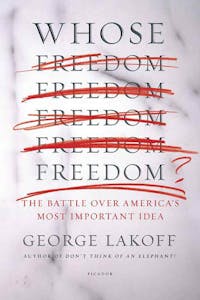Whose Freedom?
The Battle over America's Most Important Idea
 Download image
Download image
ISBN10: 031242647X
ISBN13: 9780312426477
Trade Paperback
288 Pages
$23.00
CA$24.99
Since September 11, 2001, the Bush administration has relentlessly invoked the word "freedom." The United States can strike preemptively because "freedom is on the march." Social security should be privatized and taxes for the wealthy cut in order to enhance individual freedoms. Intelligent design should be taught alongside evolution in the name of freedom of speech. The 2005 presidential inaugural speech was a kind of crescendo: the words "freedom," "free," and "liberty" were used forty-nine times in President Bush's twenty-minute speech.
"Freedom" is one of the most contested words in American political discourse. For many Democrats, it seems that President Bush's use of the word is meaningless and contradictory—deployed opportunistically to justify American military action abroad and the curtailing of civil liberties at home. But in Whose Freedom?, George Lakoff, a linguist and cognitive scientist, reveals that in fact the right has effected a devastatingly coherent and ideological redefinition of freedom. Disregarding the progressive ideal of freedom taken for granted throughout our history, the conservative revolution has made "freedom" its central weapon on the front lines of everything from the war on terror to the battles over religion in the classroom and abortion.
In his analysis, Lakoff describes how the country is divided by two dramatically different worldviews, cognitive frames that determine how we think about economic policy, religion, science, foreign affairs—and freedom. He reveals the mechanisms behind the right-wing hijacking of our most cherished political idea. And he shows how progressives not only have failed at every turn to counter this attack, but also have failed to recognize its nature and, even worse, have failed to articulate their own intuitive understanding of freedom. Whose Freedom? argues what progressives must do to take back ground in this high-stakes war over the most central idea in American life.
Reviews
Praise for Whose Freedom?
"For Lakoff, [George W.] Bush's idea of freedom is deeply problematic—antithetical, in fact, to the 'progressive freedom' that Lakoff argues has defined America and made it great. This progressive definition of freedom—the more or less continuous expansion of rights, opportunity and citizen enfranchisement—stood unchallenged for many years. But now, that freedom is 'up for grabs,' and Lakoff is worried: 'To lose freedom is a terrible thing; to lose the idea of freedom is even worse' . . . In a series of chapters on economics, religion, foreign policy and personal freedom, Lakoff compares the implications of the liberal and conservative definitions of freedom . . . Lakoff is right to identify freedom as a concept that liberals need to think about more. It's to liberals' shame that the words 'freedom' and 'liberty' are more closely associated with today's American right than with today's American left, so I admired the polemical intent of Whose Freedom?"—Michael Tomasky, The Washington Post Book World
"The strength of Whose Freedom? is that it attributes the left's current foundering not just to a failure of strategy but to a failure of self-knowledge . . . this makes a lot of sense, and it's easy to start imagining ways that pressing issues could be recast according to Lakoff's formula."—Laura Miller, Salon
"This brief, well written, and easy-to-follow volume is essentially aimed at how progressives should handle conservatives' thought processes in debates over the issues."—Jim Sullivan, The Midwest Book Review
"George Lakoff has made pathbreaking contributions to cognitive science. In Whose Freedom? he uses several of his discoveries and much wisdom to produce a systematic analysis of contemporary society and political thinking. The result is illuminating."—Antonio Damasio, author of Descartes' Error, The Feeling of What Happens, and Looking for Spinoza
"In the battle of ideas, George Lakoff is one of the progressive movement's Five-Star Generals. Here he shows what we must do to take back precious ground lost to the Right—the concept of 'freedom,' on which America's very foundation is built. Read this and arm yourself."—Robert B. Reich, Professor of Public Policy at University California at Berkeley and former U.S. Secretary of Labor
"Few words evoke more emotion or debate in this country than the word 'freedom.' Our founding fathers intended for it to be that way. And ever since, progressive political leaders have attempted to interpret and employ the concept of freedom and its relevance to American public policy debates. Arguably, President Franklin Roosevelt described it most eloquently and succinctly in his 'Four Freedoms' of speech and worship and from want and fear. George Lakoff's new book is as enjoyable to read as it is important to understand. It comes at a critical time for our country. Because freedom has always been a progressive concept, it is time for progressives to reclaim the word and its meaning in today's context. Mr. Lakoff shows us how."—Tom Daschle, former Senate Majority Leader
"One of the most influential political thinkers of the progressive movement."—Howard Dean
"Lakoff revisits the theme of his 2004 bestseller Don't Think of an Elephant!, exploring the role of rhetorical metaphors in shaping political discourse. Specifically, he explores how the conservative and progressive definitions of 'freedom' differ from one another, in order to demonstrate how liberals uphold a dominant American political tradition while 'radical conservatives' seek to overturn that legacy for their own selfish ends."—Publishers Weekly
"Democratic Party adviser Lakoff argues that the Republican Party is redefining freedom as a weapon to push its own agenda."—Library Journal



